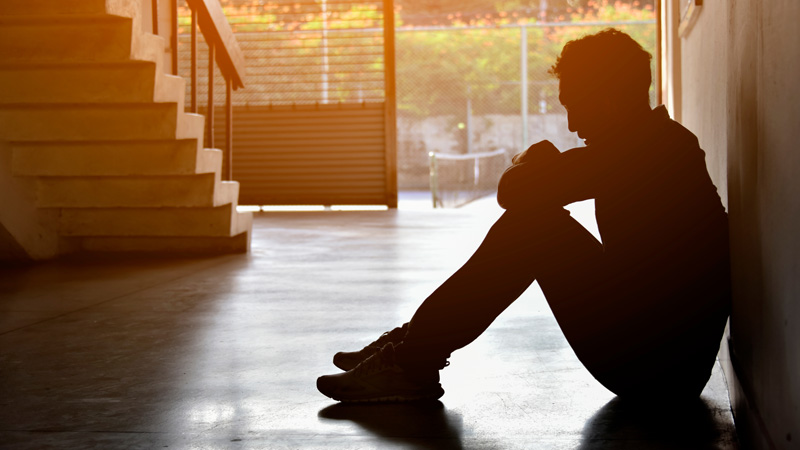Home > Personality Disorders > Schizophrenia
Schizophrenia In Teens: Warning Signs, Symptoms, Treatment, and Resources
Schizophrenia is classified as a psychotic disorder which can begin anytime in life, but most commonly becomes apparent in teenagers and young adults.
 It is a serious illness of the brain which affects an individual’s thoughts, behaviors, and perceptions of the world around them. There is an unfortunate stigma surrounding schizophrenia, along with most other mental illnesses, which can make it more difficult to talk about. Teenagers are already susceptible to caring about the opinions of their peers, and any type of mental disorder can exasperate this.
It is a serious illness of the brain which affects an individual’s thoughts, behaviors, and perceptions of the world around them. There is an unfortunate stigma surrounding schizophrenia, along with most other mental illnesses, which can make it more difficult to talk about. Teenagers are already susceptible to caring about the opinions of their peers, and any type of mental disorder can exasperate this.
It is important for parents and teens alike to be able to recognize the warning signs and symptoms of schizophrenia so that they can seek treatment and utilize the myriad of resources available as quickly as possible. If schizophrenia is diagnosed and controlled while the affected individual is young, there is a much higher chance that it will be controlled through adulthood. Recognition and acceptance of the illness are also imperative to helping erase the stigma which surrounds it.
Warning Signs:
- Difficulty filtering and processing information
- Disorganization
- Birth trauma or fetal brain damage can lead to schizophrenia later in adolescence
- Individuals who have an immediate family member with schizophrenia should avoid using marijuana as it may trigger the onset of the disease in youth who are already as risk
- Schizophrenia can be hard to spot in teenagers because normal, healthy teenagers are often moody
- Early symptoms can sometimes look like those of anxiety or depression
- Changes in thinking or lack of concentration
- Confusing television and movies with reality
- Confusing dreams with reality
- Strange ideas that don’t make sense to anyone but the individual
- Symptoms come on gradually over days, weeks, months, or sometimes years
One of the reasons it is so difficult to spot schizophrenia in teenagers is that the symptoms may not be as alarming in a young person as they would in an older adult. It also manifests itself differently in every individual it affects. Healthy and normal teenagers can often be very moody and have symptoms of depression even when they are not clinically depressed. Sometimes though, these same symptoms are those of schizophrenia. For teenagers who suffered fetal brain damage in utero or those who have an immediate family member affected, parents should be extra aware of the symptoms so that they can catch the disorder as quickly as possible. The quicker schizophrenia is spotted, the better.

Symptoms:
- Delusions
- Hallucinations
- Memory loss
- Mental confusion
- Depression
- Anxiety
- Social isolation
- Agression
- Compulsive behavior
- Hostility
- Feeling detached from self
- Apathy
- Amnesia
- Excitability
- Paranoia
- Hearing voices
- Lack of restraint
- Belief that an ordinary event has special and personal meaning
- Impaired motor coordination
- Incoherent speech or rapid speaking
- Lack of emotional response or inappropriate emotional response
There are many different symptoms of schizophrenia. If your teenager is exhibiting a majority of the above listed, you should take them to see a professional as soon as possible. However, the presence of one or two of these symptoms does not necessarily mean schizophrenia. It could be something entirely different, or it could be nothing at all to worry about. The only way to know for sure it to take your teen to see a doctor or mental health professional.
Treatment and Resources:
- Support groups
- Cognitive therapy
- Medications (Antipsychotic and Anti-Tremor)
- Family therapy
- Behavior therapy
- Psychoeducation
There are many different possible paths of treatment for teenagers who have been diagnosed with schizophrenia. It is up to you, your family, and your doctor to find the best plan of action that will work for your teen. A combination of therapy and medication may be best, or the right type of therapy might help so much that medication may not be needed at all. These are decisions that you should never make alone or without the opinion of your doctor. Finding the right support system can make dealing with any type of mental disorder so much easier.
For Information and Support
Seeking help is never easy, but you are not alone! If you or someone you know is in need of mental health treatment, we strongly encourage you to reach out for help as quickly as possible. It is not uncommon for many mental health difficulties to impact an individual for the long term. The earlier you seek support, the sooner you and your loved ones can return to happy, healthy and fulfilling lives.
Our admissions team is available to answer any general questions regarding mental health issues, treatment, and/or specific questions about the program at
Pacific Teen Treatment and how we might be able to help your family. We can be reached by phone 24/7 at 800-531-5769.
References:
Weijun Wang, Esmé. “The Collected Schizophrenias” Greywolf Press. 2019.

